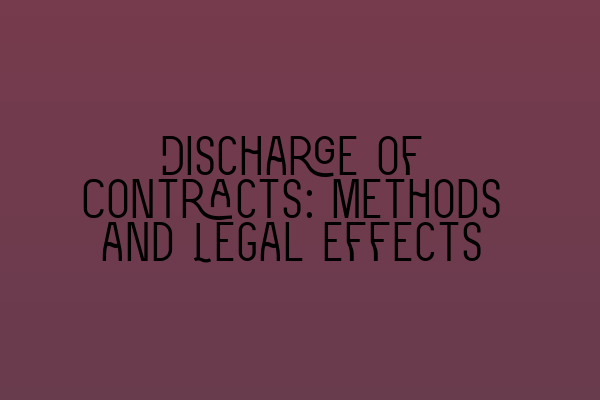Discharge of Contracts: Methods and Legal Effects
In contract law, the discharge of a contract refers to the termination or completion of the contractual obligations between the parties involved. Understanding the various methods of discharging a contract is essential for both solicitors and individuals engaging in contractual agreements. This article explores the different methods of discharging contracts and their legal effects.
1. Performance
Performance is the most common method of discharging a contract. It occurs when both parties fulfill their respective obligations as specified in the contract. When performance is complete, the contract is discharged, and the parties’ obligations are considered satisfied. However, it’s important to note that partial performance may also be recognized if both parties agree to it.
Read more about contract performance: SQE 2 Preparation Courses
2. Breach
When one party fails to fulfill their obligations under the contract, it constitutes a breach. A breach can be either a material breach, which is a substantial violation of the contract’s terms, or a minor breach, which is a partial failure to perform the obligations. In the case of a breach, the non-breaching party may have the right to terminate the contract and seek remedies for damages.
Learn more about breach of contract: SQE 1 Preparation Courses
3. Agreement
An agreement between the parties can lead to the discharge of a contract. If both parties mutually agree to terminate the contract, it can be discharged by mutual consent. This agreement can be in the form of a separate contract or a modification of the existing contract. It’s crucial to have clear evidence of the agreement to avoid any future disputes.
For examples of agreement terms, see: SQE 1 Practice Mocks FLK1 FLK2
4. Frustration
Frustration occurs when an unforeseen event renders the performance of the contract impossible, illegal, or radically different from what was initially contemplated. In such cases, the contract may be discharged due to impossibility or frustration. Frustration generally involves external factors that make it impossible for the parties to perform their obligations, such as a natural disaster or government intervention.
Discover relevant case studies of frustration: SQE 1 Practice Exam Questions
5. Operation of Law
Contracts can also be discharged by operation of law. This occurs when the law imposes an automatic termination of the contract, irrespective of the parties’ intentions or actions. Examples of operation of law include bankruptcy, illegality, or the expiry of a fixed-term contract. It’s important to note that the effects of the discharge may vary depending on the jurisdiction and the specific circumstances.
Conclusion
Understanding the different methods of discharging contracts is crucial for both solicitors and individuals entering into contractual agreements. Whether it’s through performance, breach, agreement, frustration, or operation of law, the discharge of a contract has distinct legal effects. It’s important to consult a legal professional for guidance specific to your situation.
For more information on SQE exams and preparation, visit: SRA SQE Exam Dates
